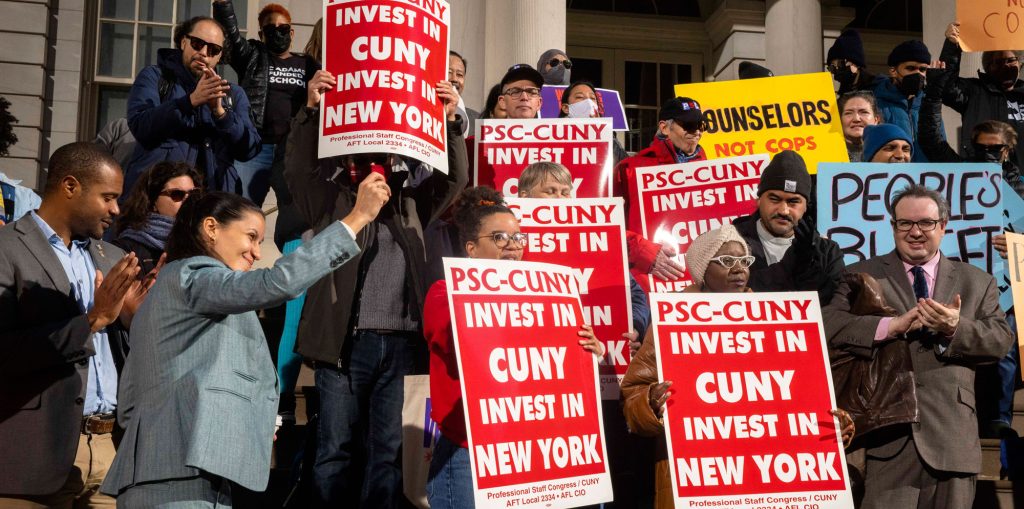
The PSC joins progressive state and city lawmakers, the Alliance for Quality Education, Jews for Racial and EconomicJustice and other activists to oppose citywide cuts. At left is City Council Member Tiffany Cabán. (Credit: Dave Sanders)
City Council Member Tiffany Cabán of Queens recalled her recent visit to Puerto Rico, where the annual Somos Conference took place. She had the chance to visit family members and speak to them about their experience of austerity.
“I can’t eat austerity,” is the message heard at Somos, Cabán told union members and community activists gathered at City Hall on November 22. But, Cabán added, Puerto Ricans have a message of hope, too. “We cook dignity,” she said.
As the crowd cheered, Cabán said, “We are going to cook and cook.”
CITYWIDE CUTS
City Hall rally attendees decried citywide cuts imposed by Mayor Eric Adams across all municipal agencies, including CUNY community colleges. Council Member Carmen De La Rosa described the mayor’s plan as “death by a million cuts” and “absolute austerity.” She added, “We want a care economy, not austerity.”
Politico New York reported in September that City Hall’s budget director “instructed commissioners to cut their spending plans by 3% this fiscal year, which ends June 30, and 4.75% each of the following three years.” This was on top of a city budget agreement last summer that included whopping cuts to city services, especially K–12 education. The cuts are wholly uncalled for, as the city’s Independent Budget Office said at the end of December that the city “is on track to end its current fiscal year with a ‘sizable’ budget surplus of more than $2 billion,” Gothamist reported.
PSC members and CUNY activists made their voices heard. Remysell Salas, an adjunct lecturer in ethnic and race studies at Borough of Manhattan Community College, told the crowd that the “cuts are egregious to me,” adding that he couldn’t believe that Mayor Adams, a CUNY graduate, is “cutting us,” prompting the crowd to shout, “Shame!”
Maya Samuel, a sophomore at Baruch College, spoke passionately about the physical decay at her campus, the result of chronic and historic underfunding of public higher education. She spoke about the lack of academic advisors, how core classes fill up too quickly (a result of colleges not having enough instructors), elevators that are constantly out of order and signs warning of asbestos in the school’s hallways. City Council Member Shahana Hanif, a graduate of Brooklyn College, said, “We need to put dollars into CUNY.”
ADAMS AND AUSTERITY
The bulk of CUNY’s funding comes from the state, and, state funding for CUNY under Governor Kathy Hochul has improved since the austerity days of former Governor Andrew Cuomo. The state budget agreement reached last spring included increases to the CUNY budget that allowed for a tuition freeze and increased full-time hiring. The CUNY budget request approved in December (see story, page 3) is also a positive one.
However, the Adams administration’s obsession with austerity impacts funding for the city’s two-year colleges. PSC Secretary Penny Lewis joined other unionists and activists at a hearing of the City Council Committee on Finance on December 8 to denounce the mayor’s sweeping cuts. “CUNY’s budget was cut 3%, worth $14.6 million by the city this fiscal year,” Lewis said. “These cuts have led to the loss of 146 faculty and professional staff positions since the pandemic. The mayor’s proposed midyear cuts of an additional 3%, worth $13.7 million, are not just an unfair burden on our members and students, but make the university’s ability to rebound after the pandemic much more difficult.”
The mayor’s ideological frugality has drawn ire across the city. “Is Adams a Republican?” asked the Amsterdam News. Although the mayor is a Democrat, many of his conservative stances attracted the enthusiastic support of the New York Post’s editorial board in the 2021 Democratic primary. Last summer, a Siena College poll found that 56% of New Yorkers believed the city was headed in the wrong direction, giving Mayor Adams a 29% approval rating.
IMPACTS TO BARGAINING
The mayor’s cuts also loom over the collective bargaining environment for municipal unions. In December 2022, Clarion reported that District Council 37 informed its members that City Hall would resist negotiating over wages until the City Council approved a measure to remove the floor under the City’s contribution to health care for in-service and retired workers and their families in order to clear the way to move municipal retirees into cost-saving and partially privatized health coverage, a move the PSC opposes. United Federation of Teachers President Michael Mulgrew told his members to brace themselves for a “tough negotiation” and a “very difficult” bargaining environment. The PSC bargains with CUNY directly, but the municipal pattern influences CUNY’s bargaining position.
While the PSC is ramping up its campaigns for a new contract with CUNY and a fair state budget, it is working at the municipal level to ensure City Council puts pressure on City Hall in the next city budget cycle to restore funds to city agencies, including CUNY.
Published: January 10, 2023 | Last Modified: January 12, 2023

